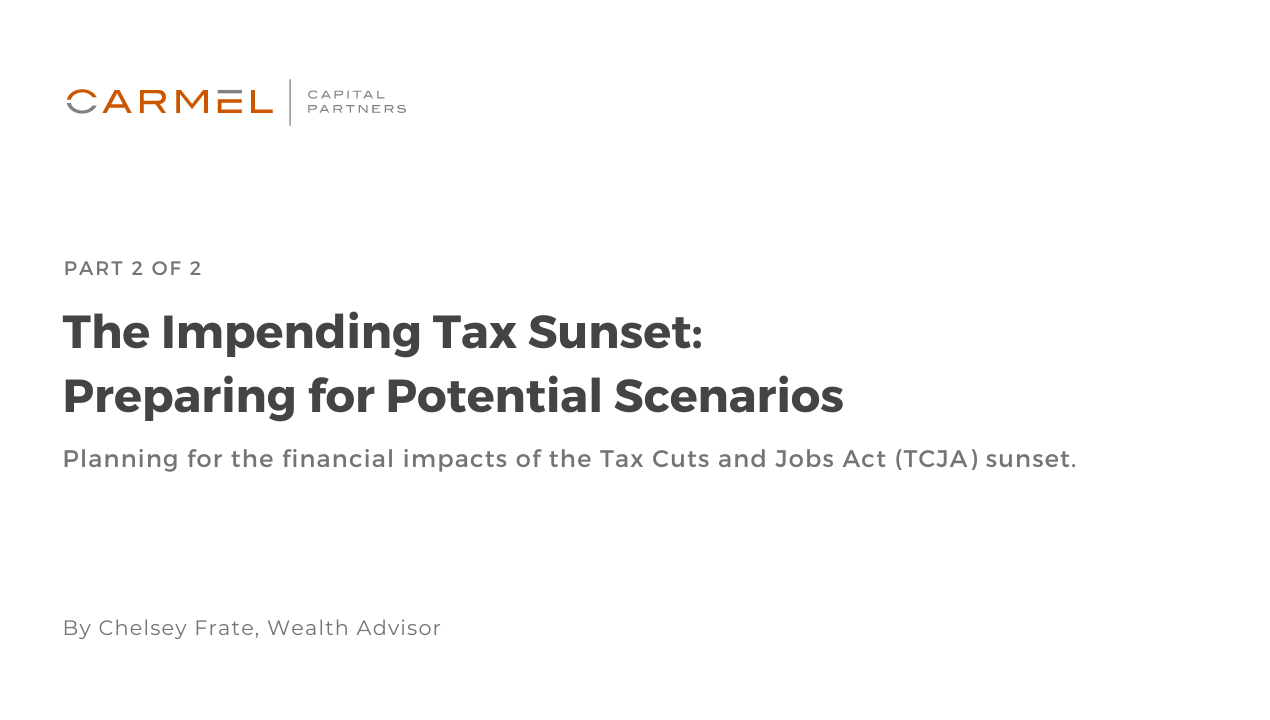The Impending Tax Sunset
In Part 1 of this series, we reviewed the key provisions of the 2017 Tax Cuts and Jobs Act (TCJA) and examined their potential impact on American...
2 min read
 Chelsey Frate
:
August 7, 2024 2:00 PM
Chelsey Frate
:
August 7, 2024 2:00 PM
The Tax Cuts and Jobs Act (TCJA) of 2017 introduced numerous benefits to U.S. tax law but are set to expire at the end of 2025. Families might be surprised by potential increases in estate tax liability and other substantial tax changes. To navigate this landscape effectively, it’s essential to understand these provisions and their looming expiration.
The 2017 Tax Cuts and Jobs Act had the overall goal of stimulating economic growth by lowering individual and corporate tax rates, among many other initiatives that were key to the creation of families existing estate plans. Provisions included:
1. Estate and Gift Tax Exemption: One of the most notable changes was the doubling of the estate and gift tax exemption. Before TCJA, the exemption was $5 million per individual (adjusted for inflation). The TCJA increased this to over $11 million, and as of 2024, it stands at $13.61 million per individual and $27.22 million for couples.1
2. Income Tax Brackets: The TCJA modified income tax brackets, reducing rates across the board. For example, the top individual income tax rate was reduced from 39.6% to 37%.
3. Standard Deduction Increase: The standard deduction nearly doubled, simplifying the tax filing process for many taxpayers. In 2024, the standard deduction is $29,200 for joint filers and $14,600 for single taxpayers.1
4. Itemized Deductions: The TCJA capped the state and local tax (SALT) deduction at $10,000 and limited the mortgage interest deduction to interest on the first $750,000 of home mortgage debt.
Many favorable provisions of the TCJA are set to expire at the end of 2025. Here's what this means for affluent families:
1. Estate and Gift Tax: The exemption amount will revert to pre-TCJA levels, estimated to be around $6.8 million per individual and close to $14 million for married couples. This shift could result in larger estate tax liabilities.1
2. Income Tax Rates: Tax brackets will revert to their pre-TCJA levels. The top individual income tax rate will likely rise back to 39.6%, affecting high-income earners.1
3. Standard Deduction and Itemized Deductions: The standard deduction will decrease, and the SALT cap along with mortgage interest deductions will revert to previous limits. This change could increase taxable income for many Californians who rely heavily on these deductions due to high property values and state taxes.
For high-net-worth families who are interested in passing on wealth, the sunset of these provisions could mean a higher tax burden for yourself and generations to come. Estate planning will become more critical than ever. Utilizing the current high exemption amounts through gifting strategies before 2026 could help mitigate future tax liabilities.
In the next part of our blog series, we will delve deeper into the potential outcomes of these changes and what steps you can take to prepare, regardless of whether Congress decides to extend any of these provisions.
1 IRS.gov, 2024.
The content is developed from sources believed to be providing accurate information. The information in this material is not intended as tax or legal advice. Please consult legal or tax professionals for specific information regarding your individual situation. The opinions expressed and material provided are for general information and should not be considered a solicitation for the purchase or sale of any security. Investment advisory services are offered through Carmel Capital Partners, an SEC Registered Investment Advisor.

In Part 1 of this series, we reviewed the key provisions of the 2017 Tax Cuts and Jobs Act (TCJA) and examined their potential impact on American...

Estate and tax planning are crucial items to complete as part of a family's financial plan. It is a topic that crosses everyone's mind but gets...

Carmel Capital Partners takes active measures to optimize our partners' investment strategies while minimizing their tax exposure, particularly...